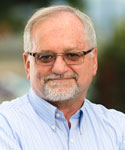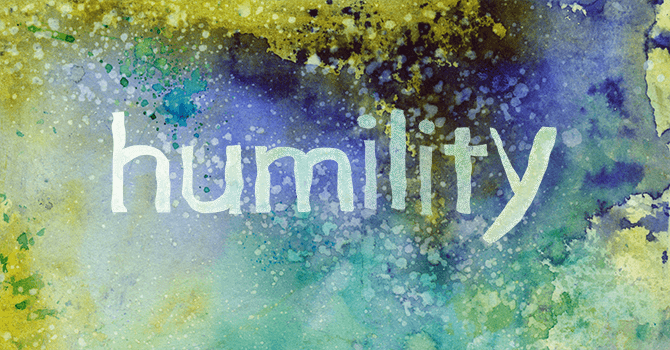Peter Hill believes that there is value in being humble, even when society says otherwise. Humility makes people more open to collaboration and more likely to consider the views of others.
 Key indicators of humility, he says, are a willingness to set aside concern for our personal status in order to do what’s right and a willingness to own our fallibility.
Key indicators of humility, he says, are a willingness to set aside concern for our personal status in order to do what’s right and a willingness to own our fallibility.
Hill is a professor in Biola University’s Rosemead School of Psychology. His research, focused on the psychology of religion, includes work on the positive psychological virtues of humility, gratitude and forgiveness. Hill also serves as director of the university’s Office of Academic Research and Grants and as co-director of the John Templeton Foundation-funded Gratitude to God project.
He spoke with Faith & Leadership’s Aleta Payne about his work. The following is an edited transcript.
Faith & Leadership: What is your definition of humility?
Peter Hill: It boils down to, in my understanding, a nondefensive recognition that one is fallible and that such a recognition is accompanied by an appropriate attentiveness to one’s limitations. By that I mean that you actually own those limitations. You don’t just acknowledge them, but you take ownership of them. That doesn’t mean you’re happy about them; in fact, I would say part of being humble is that you want to do something about those limitations. But you do own them.
F&L: What led you to explore humility?
PH: I’m a social psychologist by training, and I’ve always been interested in psychological topics, usually ones that have social implications, as well as implications from theology. I think that psychology can inform much of our theology, and I think theology can inform psychology. Humility, at least in the Judeo-Christian context, has been such a central theme. That drew my attention to the topic in general.
Somewhere around 1998 to 2000, there was a group of 20 or so psychological researchers that got together for an informal workshop. We went around the table and identified what different topics in positive psychology we were interested in and would commit to writing a paper for a special issue of a professional journal. There were things like courage and gratitude and forgiveness and so forth.
Humility was one that a person by the name of June Tangney, who ended up writing a very seminal piece on humility, was interested in. Another person, Bob Emmons, told the group that he was trying to measure humility and found that task to be very difficult. Bob ended up taking gratitude, which resulted in a defining career for him.
I did not end up taking any single topic that was discussed, but I remembered Bob’s comment about humility’s measurement challenge. In particular, if we rely on self-reports, then how do people report their humility? Do they brag about their humility? Is there kind of a modesty effect where they would tend to underreport their humility?
Those kinds of issues interested me, and given my interest in topics that are informed by theology, I started to develop this interest that has now lasted a couple of decades.
Another event cemented my interest. In 2010, the John Templeton Foundation asked a group of mostly philosophers and theologians to get together. They were interested in whether or not the foundation should invest some of its money in the topic of intellectual humility.
They also invited three psychologists, including myself, to attend this meeting. The group as a whole recommended that this is a topic worthy of study, and the Templeton Foundation has since provided considerable funding for this purpose.
The psychologists argued that if you’re going to really promote this topic and you want any sort of scientific basis to it, then you’re going to have to deal with the measurement issue. That’s when I got even more committed to studying humility, and specifically, intellectual humility.
F&L: I saw an interview where you referenced a concept from C.S. Lewis that humility is not thinking less of yourself but thinking about yourself less. Can you describe what that looks like when it happens?
PH: There are indicators of humility, associated features of humility, that some people might think are the core of being humble. Lewis’ concept is one of those. Thinking of yourself less is an indicator of humility but is not humility itself.
In one sense, thinking of yourself less is impossible to do. You have to think a lot about yourself just in terms of getting things accomplished. But what I think C.S. Lewis was trying to get at, and at least my application of what he had to say, is that we’re not always taking center stage on things.
There is a line of research in social psychology called the spotlight effect. It’s easy to talk about it when we think about junior high individuals. We say that kids always think that everything revolves around them. They can’t go to school that day because they’ve got a pimple on their face, and everybody’s going to notice it and make fun of it. It’s as if they are center stage. What really matters to everybody is their own self-presentation.
To some extent, we’re all guilty of that. Even as I was thinking about this interview, I thought a little bit about the spotlight effect and that not everything is going to revolve around what I have to say in this particular interview. What’s interesting is once I realized that, I then didn’t feel as much pressure. The world will go on.
I think that’s what Lewis was saying. For me doing this interview, I should just think about the issues. Think about humility as a concept and how we want to try to get at it, versus a focus on whether I’m saying the right thing and somebody else who happens to have a different take on it is saying the wrong thing. It’s taking ourselves, as much as possible, out of the equation.
Some people have called it self-forgetfulness, and I like that term, but I don’t want to say that’s really at the core of what humility is. It’s just a good indicator of humility, an associated feature, that you forget about yourself at times. You get caught up in everything else. Maybe it’s the group dynamic. Maybe it’s the demands of the situation. You enjoy the moment without always evaluating where you stand in that moment.
F&L: You’ve said and written elsewhere that putting people in places where they are experiencing different perspectives can be one way to foster humility. Can you explain that?
PH: I think the natural tendency for us is to be tribal. We hang out with people who are like ourselves. Those are the people we tend to like the most. A lot of times, they reinforce what we already think, so there is a tendency to be thinking in-group versus out-group, us versus them.
Sometimes, if we can force ourselves to get outside the tribe, if you will, that’s good. There are some structured ways in which we can do this. I know a student who is very religiously committed who joined the atheist club at her institution, not to persuade or to be persuaded by, but to try to understand and to learn. It’s usually very educational.
F&L: Faith communities are not always particularly diverse places. In fact, they’re typically not diverse at all. How can humility be present, be encouraged? How in our churches does humility show up and possibly flourish?
PH: I think once you start getting into the religious or spiritual realm, you start getting into some tough questions. Especially for people whose faith is important to them, issues associated with faith are topics where strong feelings are held.
Often in that context, we talk about our convictions, things that we believe, and we believe them strongly. I think that you can have convictions and still be a humble person. Whether they’re religious or not, everybody is in a position that they have to make decisions about what they think is right and wrong. That’s just a given of human nature. We live in a world that calls for us to do that.
You have to assume, when you’ve tried to make those calls, that you are right. Otherwise, you would not have made the call that you did. That leaves you with two big questions.
First, are you open to changing that view or revising that view of what you believe if there’s sufficient evidence out there that says you should do so? To what degree are you going to allow evidence to influence what it is that you thought you were right about?
Second, are you willing to explore the evidence fairly? In other words, applied to the political realm, are you going to listen only to CNBC or to Fox News, depending on which one you’re oriented toward, or are you going to listen to both? Are you willing to give the issue a fair hearing?
That’s the distinction. I don’t think it’s so much holding a belief or holding a conviction, but it’s the way in which you hold it. Those are the two big questions. Are you going to allow evidence to modify your belief if sufficient evidence is there, and second, how did you determine whether the evidence is there or not?
Sometimes this means that we have to think about or do things differently. As you’ve noted, faith communities are usually not very demographically diverse, and not open to new ideas. Often, a faith community’s identity is formed on the basis of theology, and that needs to be respected. But communities should also be willing to look critically at their theological assumptions.
What about the church’s functioning in relation to the rest of the world? My own church had an interesting situation. A few years ago, in the town that I live in, there was an event that was established by the city. It was a triathlon, and it was going to be held on a Sunday morning. A key road for the triathlon that was going to be blocked off was the road that the church is on. You’d have to be quite creative and willing to walk a long distance to get to church that Sunday.
Instead of complaining about the plans for the triathlon, the church did an interesting thing, and it was something they had not thought of before. They said, “Let’s not hold church that Sunday, but let’s do something else.” They established what’s called Serve weekend, where they just got out that entire weekend -- including Sunday morning -- into the community and worked, doing such things as painting, cleaning and the like.
Now it has become a once-a-year event on the date of the triathlon. It took an event like the triathlon to get us outside our own building and into the community. It opened our eyes to new possibilities. That’s what a little bit of humility can do.













